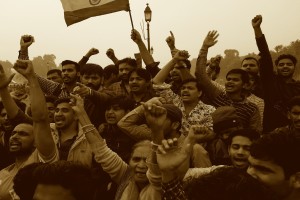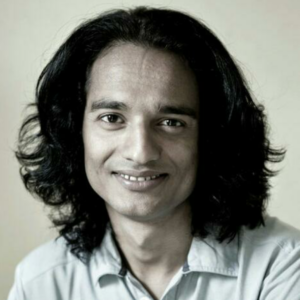
 By Kaushal Kishore*
By Kaushal Kishore*
Gandhi, Shastri, J.P. and Lohia are ritually remembered in the first fortnight of October. The influence of these four leaders of the previous century is clear on the Indian politics before and after independence. The Satyagraha for Aviral-Nirmal Ganga has added the names of crusaders in the twenty-first century. Prof. G.D. Agarwal is known for the series of nonviolent protests to save the free flow of the Ganga in the upstream at Uttarakhand. A mantra, Aviralta Bin Ganga Nirmal Nahi (The Ganga is not pure unless flowing freely) came out of his decade long Satyagraha. At last, after the 111 days of fasting, he has left the mortal coil for heavenly abode on the birth anniversary of Lok Nayak Jai Prakash Narayan. In the context of the Ganga, he has drawn a long line like Mahamana Madan Mohan Malviya to add his name among crusaders. The presence of Satyagrahi spirit during public service is a common feature of these leaders, and their messages are all the more relevant today, however, it’s not possible to repeat the old tradition of celebrations due to the pandemic.
This is the centenary year of the demise of Lok Manya Bal Gangadhar Tilak. The Union Home Minister Amit Shah has appropriately attributed to him to cross the chasm between Maran (death) and Smaran (remembrance). Maharishi Dayananda Saraswati’s efforts to establish the Indian home rule against colonial regime got strengthened by one of his slogans that described the Swaraj (home-rule) as the birth right in order to achieve it. In the era of the trinity of Lal-Bal-Pal, the Congress was divided into the two different fractions of hard-liners and soft-liners. In the British jail, he has authored the Gita Rahasya. Gandhi has referred to him as one of his masters between Pherozeshah Mehta and Gopal Krishna Gokhale. Tilak and his legends include the school of politics as well. Undoubtedly Gandhi is the top student of this school of the craft known as statesmanship.
Also read: “It’s impossible to forget such a revolutionary consciousness”
The disciple, who compared Lokmanya as the ocean, referred to himself as the politician trying hard to be a saint. After his departure, Lala Lajpat Rai started The Tilak School of Politics at Lahore (now in Pakistan), which metamorphosed into Servants of the People Society next year. Hindi proponent Rajarshi referred to it latter as Lok Sevak Mandal. Gandhi delightedly visited Lahore on the occasion of its inauguration, and encouraged the likes of Balvantray Mehta and Lal Bahadur Shastri to join these institutions. One of the top students Chhabil Das was later appointed as its principal as well. In the era of Capitalism and Socialism the idea of Gandhian home rule appeared as a different kind of long lasting politics. The world look at his Satyagrahi philosophy as the third path centred around dialects and cultures, more like a part of the nature. As such there rests a sense of respect towards it in this age of modern technology and globalisation.
Gandhi expressed his views on many topics affecting the public life including epidemics and vaccination. His sensitivity on these issues is necessary to notice in order to deal with current crisis. At the age of thirty-seven he has written Guide to Health to expose political economy of the epidemic and vaccination. In one of its chapters a series of questions on it is raised. The maturity of his political views appeared in Hind Swaraj that was written before he appeared on the India political scenario. Jai Prakash Narayan, Lal Bahadur Shastri and Ram Manohar Lohia are more like his followers. Professor G.D. Agarwal moved towards the Satyagraha by the last decade of his life.
Mahatma Gandhi believed that vaccination is a barbarous practice, He wrote, “It is one of the most fatal of all the delusions current in our time, not to be found even among the so-called savage races of the world.” In 1906 condemned vaccination against contagious diseases. The evils of vaccination against the contagious disease of that period small pox is described in an exclusive chapter. He observed, If it were really a contagious disease, everyone should catch it by merely touching the patient; but this is not always the case. Hence there is really no harm in touching the patient, provided we take some essential precautions in doing so. We cannot, of course, assert that small-pox is never transmitted by touch, for those that are physically in a condition favourable to its transmission will catch it.” Referring to the five key points of the British Anti-Vaccination Society, he concluded, “The fact of the matter is that it is only the self-interest of doctors that stands in the way of the abolition of this inhuman practice, for the fear of losing the large incomes that they at present derive from this source blinds them to the countless evils which it brings.” The number of people standing in the way of its abolition has increased to such an extent that it’s difficult to stand on it.
A decade before Dandi March and Salt Satyagraha, he had given up the salt. All life remained dependent on goat milk and natural herbs. Gandhi is known to make floor and carpet muddy while being wrapped in the mud packs during his morning ablutions at the Jinnah House in Mumbai. He has evolved the culture of Satyagraha that largely depends on the mother nature. As a leader he never hesitated to change the opinion on certain issues, but on technology and vaccination he remained the same. Today its recitation is necessary.
Satyagraha is one of the most powerful political weapons that Gandhi introduced to the world. After independence a few of his disciples like JP and Binova tried hard to take it forward, and this period also witnessed the increasing politics and declining statesmanship. Today due to the pandemic people around the world are scared. It is important to remove this fear and that deals with the vaccine. Gandhi’s life of a Satyagrahi is his real message. His day started with the naturopathy sessions and Yoga. The study of it can be helpful to boost the immunity with a hygienic and healthy lifestyle.
*The writer is a social activist and author of The Holy Ganga (Rupa, 2008), Managing Editor of Panchayat Sandesh, and his column Across The Lines appears in the vernacular publications.





